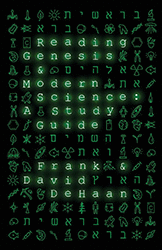Return to 1st Quarter 2020 articles.

Reading Genesis & Modern Science
by Frank and David DeHaan, Credo House, © 2018,
102 pages, $9.99 (paperback), ISBN-13: 9781625861177

This small book is written as a study guide for an eight-lesson course. The authors have PhDs in chemistry and are active in their local churches. They state six goals for the study:
- Appreciate the strength of the scientific evidence for an old Earth and universe.
- Critique from a scientific perspective the approach/methods used to reach a “Young Earth” conclusion.
- Utilize alternate ways to understand early Genesis chapters, especially Genesis 1.
- Express why this matters to a Christian today.
- Understand the causes, magnitude, and seriousness of global climate change.
- Consider what you can do now to take better care of God's Earth.
We have pointed out many times that the Young Earth view of the age of the cosmos is not biblical or scientific. It is a denominational teaching based on dispensationalism. It does not take the Bible literally and embraces a poor understanding of science. This book does a good job of showing the scientific evidence with discussion questions after each lesson. At the end of the book, you will find further discussion and comments on the questions. Some of the authors' views on the biblical record are very questionable. Treating the Nephilim of Genesis as a part of the Neanderthals, for example, misses the point that the Hebrew word means “fallen ones” and has a spiritual, not physical connotation.
Because David DeHaan is an expert in atmospheric science, there is a little overkill on climate change. The book would be difficult to teach a high school class but should work well with college students. Those who want to make the message of Genesis totally non-scientific and completely miraculous will not find the book to be useful.
